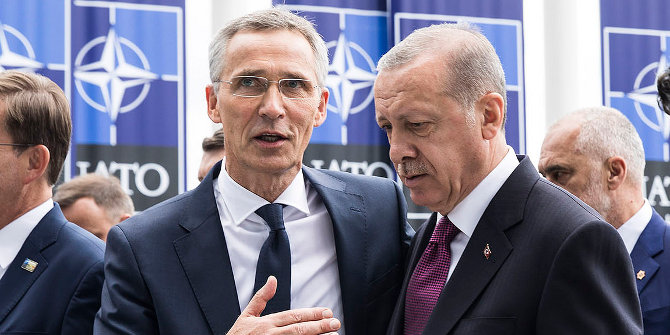 As President of the United States, Donald Trump has pledged to implement a trade policy that puts ‘America first’. Christiaan R. Boiten argues that Trump’s approach could create an opportunity for the EU to gain an advantage in key markets by signing new free trade agreements, such as the proposed agreement between the EU and Japan.
As President of the United States, Donald Trump has pledged to implement a trade policy that puts ‘America first’. Christiaan R. Boiten argues that Trump’s approach could create an opportunity for the EU to gain an advantage in key markets by signing new free trade agreements, such as the proposed agreement between the EU and Japan.

The EU and Japan announced in July that they would negotiate a free trade agreement, Credit: European Council President (CC BY-NC-ND-SA 2.0)
International trade is deeply ingrained in the DNA of Europeans. According to OECD data, in 2015 exports amount to 44 per cent of EU GDP, against 12.5 per cent for the US and the OECD average of 28.8 per cent. This trend is easily explained by the differences in factor endowments and markets across the Atlantic. The potential for economic growth potential within Europe is severely restricted by its geography, fragmented internal market for services and stagnated labour force. For its future jobs and growth, the European economy therefore increasingly depends on foreign markets. Free trade agreements are the best policy instruments to improve European businesses’ access to these markets.
The US is less dependent on trade than Europe due its large homogenous internal market. For instance, its market size allows start-ups to exploit increasing economies of scale and successfully scale up innovative technologies. Given these fundamentals, President Trump may have envisioned himself more political room for manoeuvre for his protectionist ‘America First’ policy. However, the price to be paid for the resulting insecure American trade and investment climate is gradually starting to ratchet up. Due to economic interconnectedness and global value chains, it will become increasingly costly to follow an autonomous economic course in the 21st century, even for a superpower.
The EU-Japan free trade agreement shows a clear contrast between America First and the European approach to trade policy, which is focused on mutual economic interests. Its longstanding security arrangement had led Japanese decision-makers to initially prioritise the Trans-Pacific Partnership, but Trump’s rejection of the negotiated TPP treaty landed EU negotiators an opportunity to seal an ambitious trade deal. The parallels with the EU-Korea free trade agreement – a comparable economy in terms of trade barriers – are significant. With the EU able to profit from the US Congress’ reservations about ratifying the negotiated US-Korea free trade agreement, European businesses gained access to the Korean market one year in advance of their US competitors. Within five years, EU exports rose by 55 per cent. By capitalising on their ‘first mover advantage’, European businesses succeeded in gaining a firm foothold in the Korean market. Regarding both Japan and South-Korea, EU decision-makers were therefore able to exploit instances of American protectionism.
The full extent of the damage that Trump is inflicting on the competitiveness of the US will only become visible in due course. As negotiating free trade agreements commonly takes at least a couple years, careful policy planning is essential. EU decision-makers seeking to capitalise on US protectionism should therefore select and prioritise trading partners that have the most potential for EU businesses to rapidly gain market share over their US competitors. In this respect, trade talks with the fast-growing economies of South-East Asia – treaties with Singapore and Vietnam are already awaiting ratification – offer a multitude of opportunities for European businesses to exploit their first mover advantage. Furthermore, the ongoing negotiations with Mercosur and Mexico may remove many trade barriers for European exporters to Latin America. Fierce opposition towards deals with China and India, among several important European economic sectors, does, however, demonstrate the limitations of this strategy.
In addition, the shifting balance of power caused by Brexit is very likely to increase the influence of protectionist EU member-states on the EU’s free trade agenda. It is therefore significant that during his election campaign, French President Macron sought to compel the EU’s trading partners towards reciprocity in public procurement. He repeatedly threatened to close the already largely liberalised European market, despite the evidence to the contrary presented by the failure of a largely similar plan advanced by Karel De Gucht and Michel Barnier while they were European Commissioners for Trade and the Internal Market.
The opening of the previously impenetrable Japanese public procurement market therefore constitutes a major coup for the EU. As this type of market access can only be credibly secured using issue-linkage strategies, there is no viable alternative to free trade agreements. The danger now is that Macron’s use of gesture politics and similar populist approaches to trade policy may develop into a source of friction with Europe’s most important trading partners.
Access to the considerable American procurement market has already been limited by the pre-existing ‘Buy American’ legislation, which has since developed into a poster child for Trump’s America First-style politics. The Trump Administration’s attitudes toward EU steel exports indicate that ill-advised brinkmanship on politically charged issues, such as public procurement, might even have the potential to spark a Transatlantic trade war with great losses for both sides. An increased hold of protectionist EU member states over EU trade policy is therefore not without risks.
Please read our comments policy before commenting.
Note: This article gives the views of the author, and not the position of EUROPP – European Politics and Policy, nor of the London School of Economics.
_________________________________
 Christiaan R. Boiten
Christiaan R. Boiten
Christiaan R. Boiten a political economist and independent consultant. He holds an MSc in International Political Economy from the London School of Economics and an MA in European Studies from Maastricht University.




